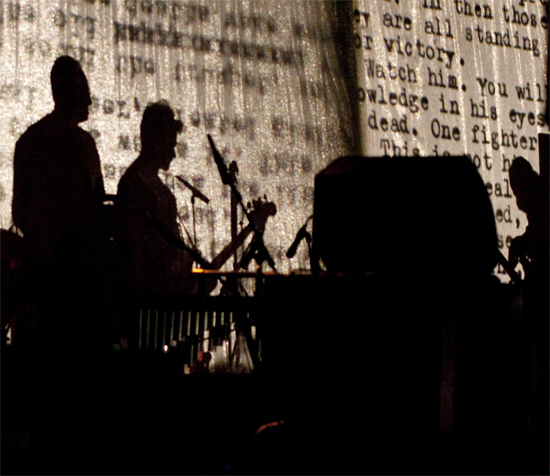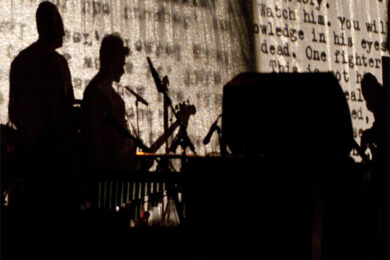Musicians mill about in semi-darkness on the stage at Berlin’s Astra Club as a deep droning sound rumbles like a malfunctioning PA. 1800 people, notably dominated by bearded men approaching what was once known as their middle age, push forward through the squeeze with plastic beer cups held aloft over their head. A projector rattles and the word ‘HOPE’ flickers across the screen. For 15 minutes, as the rumbling grows into one huge, tumescent roar, that’s all we’ve got: HOPE. We’ve waited the best part of a decade to see Godspeed You! Black Emperor perform live again, and God knows those hopes are high.
There’s a moment early on, not long after the droning has transformed into something recognisable, which reminds me just how extraordinary they can be. Quite without warning, my stomach is pulled from its lining, a chord change precipitating a feeling so awful, so full of unimaginable sorrow, that it’s as though I’ve just learned that I have one month to live. It’s a shock, a completely unanticipated manipulation of my emotions achieved magically through the simple changing of pitch and tone. They don’t ever provoke quite that same sensation again, but – combined with the eerie sight of musicians at times silhouetted against a bright white backdrop, at others overshadowed by grainy experimental film footage of everything from bright orange flames to filing cabinets whose records, complete with wilted passport pictures, are flashed before us – their mighty sound remains regularly awe-inspiring. It’s like an Andy Warhol warehouse party where someone’s spiked Lou Reed’s drinks with opium and given John Cale a kilo of speed and a string section.
Unfortunately, however, through much of this back-straining two and a half hour concert there’s a nagging and frankly annoying feeling – a symptom of unexpected cynicism that what they’re doing is no longer as exciting as it once was and almost as predictable as a Velvet Underground simile. It’s less to do with their performance than with the baggage they carry. Since the 1997 release of F # A # ∞, their debut album (not counting their debut cassette release, 1994’s All Lights Fucked On The Hairy Amp Drooling), Godspeed have defined a particular sound. Although at their birth they were lumped in with the growing ‘post-rock’ genre – still, surely, one of the most absurd pigeonholes ever manufactured – they shared few musical traits with the likes of Tortoise or Sacha Frere-Jones’ Ui, instead coming across like an apocalyptic Mahler had he grown up during the Cold War with a Marshall stack in his bedroom and a telescope to the skies. Their peculiar brand of quasi-orchestrated, epic instrumental rock, full of brooding, threatening drama, creeping crescendos, paranoia and pleasure in equal measures, helped earn them a cult legendary status, and few acts – perhaps Mogwai, maybe Sigur Ros, possibly Explosions In The Sky – have ever been thought of as their equals. Godspeed have a lot to live up to, perhaps more than is strictly fair.
More importantly, when Godspeed first arrived we greeted them like the first of a new race who were destroying boundaries with unprecedented conviction. Combined with their epic style, their shaggy look helped create the illusion that they were visionary seers emerging from the wilderness, and their minimalist album artwork over the course of their career helped deepen the mystery: F # A # featured blurred black and white photographs, and ransom note cut-and-paste typewritten text; Slow Riot For New Zerø Kanada didn’t even feature the band’s name anywhere on the cover, instead offering a quote from the bible in Hebrew and instructions in Italian about how to make a Molotov cocktail; Yanqui O.X.O. offered diagrams that revealed links between major labels and weapon manufacturers. They succeeded in maintaining this sense of anti-establishment inscrutability through their lack of interest in publicity and an implicit, almost impeccable refusal to compromise their art. The critics consequently went mad, given free rein to generate hyperbolic prose in which to project their own interpretation of what Godspeed stood for in the absence of Godspeed doing it for themselves. Hell, even the NME did away with their traditional front cover photo after the band refused to pose for a session. They were too far down the road with the band to reject them, instead running the opening spoken words from ‘The Dead Flag Blues’ – “the car’s on fire and there’s no driver at the wheel and the sewers are all muddied with a thousand lonely suicides” – above the strapline “Apocalypse Now: The Only Interview”. Godspeed had become a matter of life and death.
Now, though, it’s easy to see such behaviour as signs of overexcitement. Back then GSY!BE stood out from their contemporaries, having seemingly created their own space, leaving anyone with above-average attention spans slack-jawed in their wake. But they didn’t herald the end of days, and instead preceded the arrival of a hell of a lot of bands that were all “a bit Godspeed”. Not one act that has specialised in instrumental rock and exhibited a love for soaring guitars since then has failed to be compared to the Canadians. In fact the racks are full of artists who are “a bit Godspeed”, somehow lessening the impact of each successive record they release: Godspeed no longer have exclusive rights to the genre. They might be able, possibly without knowing how, to conjure up mirages built of sentiment and sound that transcend logical explanation, but we’ve learned it’s not a trick that’s exclusive to them.
Godspeed’s influence has now infiltrated widespread contemporary culture. All those trailers for televised football with Sigur Ros tunes accompanying them? Godspeed paved the path. All those bands that put wasted landscapes on their album covers, and whose music turns up in commercials and TV dramas at suitable ethereal / tense / pretentious moments? Godspeed invented them, obviously. That painfully tense soundtrack to the clincher scenes in Danny Boyle’s 28 Days Later? It’s ‘East Hastings’, by the painfully reticent Montreal collective itself. (They don’t allow such licenses very often, but at least they know how to pick ’em.) Godspeed might have been, until recently, almost invisible, but they’ve nonetheless been everywhere, and having had so many bands measured against them, it’s almost impossible now not to measure them against those bands. Were their debut to hit stores in 2011 instead of in the wake of the commercialisation of grunge and the advent of Britpop and ladrock, maybe we’d no longer have the patience with which we once allowed ourselves to be drawn into the intricacies of their music and would instead declare them “a bit Glenn Branca”.
Godspeed were the beneficiaries of the times in which they emerged. If we choose to consider them in the light of all those who have followed their path since, however, then they risk being its victims, overshadowed and sidelined. Similarly, if we openly accept that others initially influenced them, then there’s a case to be heard that suggests they’re as open to accusations of thievery as those who have appeared in their wake. But we use context to help define what matters, and try to ignore it if it contradicts what we’ve already decided. We adjust the rules to suit our needs because if we shift things on their axis just a little, we risk upsetting the balance. So we can’t contextualise them in the here and now because that risks belittling the virtues for which we acclaimed them. In other words, we’re subconsciously conceding that we may have overegged the pudding.
So if we wish to avoid the hypocrisy inherent in giving them a free pass denied to others purely on the basis of their timing, perhaps we should give context less credit. While Godspeed remain the recognised rulers of their domain, it only takes a little cynicism to dismiss them now as easily as we have dismissed the many so-called pretenders to their throne. After all, quite apart from the fact that other artists may have been mining the same vein before them and Godspeed might simply have been the right band in the right place at the right time, that chart on Yanqui O.X.O was actually inaccurate, and we only forgave them their error because they were what we wanted. And although we bought into it at the time, all that mystery within which they cloaked themselves was just as contrived – if on a smaller budget – as Lady Gaga’s meat dress.
Fortunately, Godspeed’s music lives on long after the steaks have gone rotten, and that’s all that really matters. Shorn of what was once their apparent birthright – hyperbole – and free of their original context, it’s still possible to see that Godspeed are at times monumental: there’s a grandiose beauty in the noise they whip up and a solemn grace to their restraint. It would be nice to think that we would have discovered and loved them just as easily if all we had heard back then was their music and had therefore not mistaken them for the Second Coming. Ultimately, it’s only by separating them, at least a little, from their past incarnation as well as from contemporary culture that we can now spare ourselves from the suspicion that they are no longer relevant. Applied across the board, this music-focussed approach might not get the blood pumping with quite such ferocity, but it might save us from the disappointment of getting worked up by only mildly above-average acts on the basis of them not sounding like something that already exists or having a new haircut. It may even help us discover others whose impact is somewhat more subtle but nonetheless potent. Music is music, and if we want to avoid the tedious, never-ending build-’em-up-and-knock-’em-down cycle, we might want to consider saving time spent worrying about the circumstances in which acts emerge, and instead enjoy (searching for) the kind of timeless qualities that have allowed bands like Godspeed to transcend their origins. Because these are what give hope to get us through the droning…



